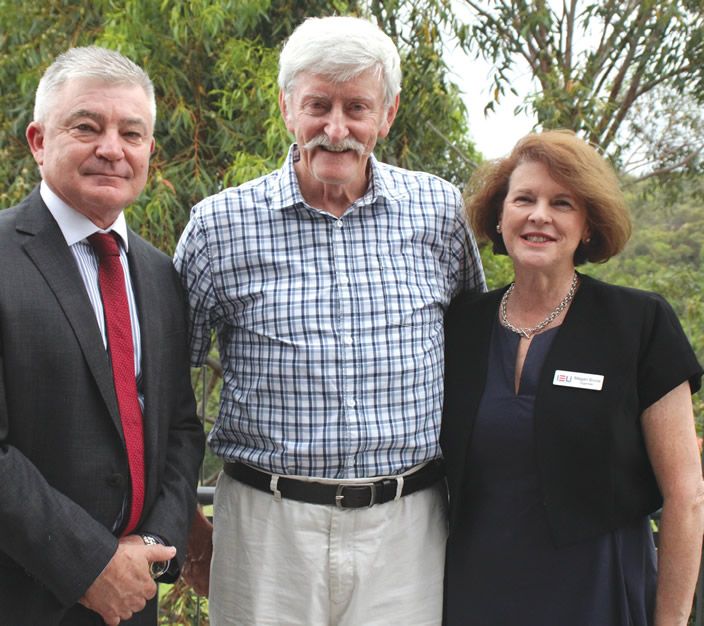
Non government school employees owe a debt of gratitude to people such as Bob Menzies. If you work at an independent school and get paid for extracurricular activities, thank Menzies. If you have a nice nest egg in your NGS account, thank Menzies and the other founding members of the IEU and NGS superannuation fund.
Menzies (pictured top, centre with IEUA NSW/ACT Secretary Mark Northam and Organiser Megan Bruce) retired last year after 51 years in education. He spent about 25 years teaching economics, legal studies and commerce, 10 years as an IEU organiser (one of the very first to hold such a role) and was the inaugural IEU research officer. From 1988 to 1998 he developed the NGS superannuation fund.
Early career
Menzies began his career as an economics teacher in Melbourne in 1969. His contract also required him to teach typing and shorthand – something of a challenge as he could do neither.
His teaching career was soon interrupted when he got the call to represent Australia in the water polo team at the 1972 Olympic Games in Munich.
The team, which was not as well resourced as the Europeans, came a creditable 12th. The Palestinian terrorist attack in the Olympic village put something of a dampener on the event, but Menzies said it was still an “amazing experience”.
Back to Barker
Menzies stayed on in Europe, teaching at a large comprehensive school in London before returning to take up a position at Barker College in 1974.
“They wanted someone with sporting experience who could teach economics and commerce, and I ticked those boxes pretty well,” Menzies said.
“The principal at Barker in those days was very autocratic. I became president of the Common Room Association, and he was supposed to consult me on industrial matters and dismissals.
“But he didn’t consult, he just hired and fired on a whim, quite unfairly. I thought, ‘surely there must be an organisation to monitor this behaviour’. I started looking for a union for independent teachers and found the Independent Teachers Association (ITA) in North Sydney. The ITA evolved into the IEU when support staff joined in 1994. In 1985, Menzies published a history of the ITA.
On the road
The ITA only had two staff but Menzies found the union at a time of rapid expansion. For years Catholic schools had been staffed by nuns and brothers, but that was changing. The employment of lay teachers was an opportunity for unionisation. Menzies became one of two ITA organisers, along with lawyer Mary Jerram, who introduced many groundbreaking conditions for women.
“It was my job to drive around all these little Catholic schools and recruit people,” Menzies said. “The Catholic Schools Office encouraged us. The nuns had never met a trade unionist before and they asked me if I was a communist or if I believed in God. But I was always politely invited in and offered tea and scones and staff were encouraged to join the union.”
There was a lot to do, as nuns had little understanding of workers’ rights. “One nun would open pay slips and allocate the pay as she thought appropriate,” Menzies said.
Ongoing evolution
When Menzies started at the union it had 1600 members, and when he left in 1988 it had 16,000. Today it has 30,000 in NSW and the ACT, and 60,000 nationally.
“We were making things up as we went along,” Menzies said. “We had few previous rules to go on.”
It was during this period that many of the important rights and conditions that now influence school employees’ daily lives were laid down.
“Catholic staff who were ‘living in sin’ could be sacked, so we had to go into battle for those individuals,” Menzies said.
“Saturday sport in independent schools was expected for no extra pay. We ran a work values case before an industrial judge for compulsory Saturday sport pay.
“The judge, who was an old boy of one of those schools, concluded it was a privilege to be allowed to work in one. It was a devastating decision for us, but he did say schools could feel free to pay extra anyway, and that’s what actually happened.”
Super gets started
There was no superannuation fund for Catholic school employees, and most independent schools had a ‘vested’ scheme.
“You had to retire at the school to get your superannuation,” Menzies said. “If you’d worked at a school for 30 years but had to leave before your official retirement, you didn’t get a penny. Teachers were retiring into poverty.”
The ITA organised a private provider to offer super until 1988, when it became mandatory for employers to provide 3 per cent super.
Menzies was fund secretary and was integral to the establishment of NGS. “At first my office was in the storeroom with the spare tables and chairs,” he said.
Menzies went on to develop a career as a consultant to superannuation funds and as a public speaker around the time of the Sydney Olympics.
Same but different
At age 60 Menzies returned to the classroom as a legal studies teacher at Mater Maria Catholic College in Warriewood, on NSW’s northern beaches.
“People ask me if teaching has changed much over 50 years,” Menzies said. “The answer is ‘no’. Apart from technology, teaching children has remained the same.”
A sense of fairness has driven Menzies’ entire career. Even at Mater Maria he was acting IEU rep, covering when the rep was on leave.
Menzies said he’s still getting used to having an open diary, but golf, reading, gardening and travel are on his agenda.








































































































































